
Welcome to Hong Kong FinTech Week!
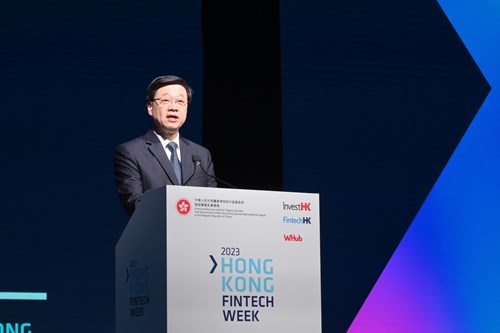
“Hong Kong is made for Fintech companies, entrepreneurs and investors!”
Opening Keynote by John Lee, Chief Executive, Hong Kong SAR
Hong Kong’s Chief Executive, John Lee, got Hong Kong FinTech Week 2023 underway with a bang, telling a packed keynote audience that the city is the ideal environment for Fintech. Citing Hong Kong’s position as one of the world's leading financial centres and China's major financial sector, he said “No other economy can claim our unique advantage under the one country two systems principle, to draw on and create opportunities from both our country and the world at large.“
This year’s event theme is "Fintech Redefined", which he noted will help shape the future of Fintech in every dimension. After referencing initiatives in his recent policy address designed to boost growth and promote the sustainable development of the Hong Kong Stock Market, he revealed plans to promote the better integration of Fintech and green finance, and establish Hong Kong as a green Fintech hub.
Last year, the green and sustainable debts issued in Hong Kong exceeded US$80 billion, while green and sustainable bonds arranged in Hong Kong accounted for more than one-third of the entire Asian market.
“These, and other achievements, reflect the prowess of Hong Kong's financial sector and its potential. The HKSAR Government is committed to the continuing rise of Fintech and is expanding research and reach and influence in Hong Kong and beyond. We offer unparalleled opportunities for Fintech businesses to grow and thrive in this 21st century of opportunities,” he said.
Please refer to the official speech here.
Click here to watch the playback.
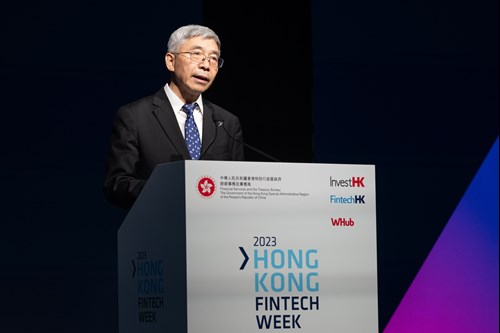
“The Greater Bay Area, as one of the most open, dynamic, and competitive world-class city clusters, is well-positioned for developing Fintech and inclusive finance.”
Keynote by Zhang Qingsong, Deputy Governor, People’s Bank of China
Zhang Qingsong, Deputy Governor, People’s Bank of China, shared his observations about inclusive finance empowered by Fintech in Mainland China.
He stated that over the years, the People’s Bank of China (PBoC) has attached great importance to Fintech, as a technology-driven financial innovation that has become a key engine for promoting inclusive finance in the digital economy.
He shared the PBoC’s practices to promote inclusive finance through Fintech, such as guiding financial institutions to build digital business systems underpinned by data and computing power. Zhang also focused on micro and small businesses (MSBs), detailing how PBoC has helped them use Fintech to develop financing plans based on differentiated algorithms and establishing digital risk control to improve credit approval and overall risk management. These processes have achieved tremendous results, with MSB loans reaching 29 trillion RMB and an all-time low on interest rates. He spoke briefly about how PBoC’s digital technology features helped elderly and people with disabilities to bridge the digital divide.
He noted that “Hong Kong is an international financial centre, as well as an innovation and technology hub. The Greater Bay Area, as one of the most open, dynamic, and competitive world-class city clusters, is well-positioned for developing Fintech and inclusive finance.”
Finally, he announced that PBoC will sign a tripartite MoU with the Hong Kong Monetary Authority and the Monetary Authority of Macau to further strengthen regulatory cooperation on Fintech innovation in the GBA.
Click here to watch the playback.
Highlights of the Day
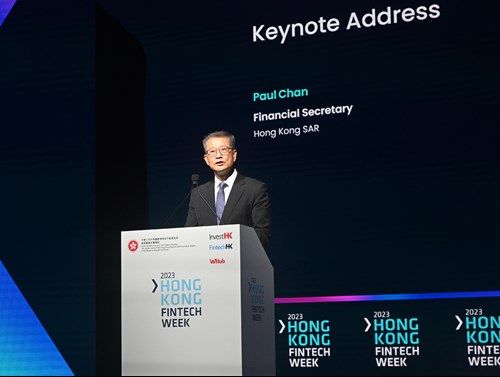
“Fintech is not just for banking. It is a catalyst for driving change and innovation.”
Keynote by Paul Chan, Financial Secretary, Hong Kong SAR
Hong Kong’s Financial Secretary Paul Chan used his keynote address at Hong Kong FinTech Week 2023 to redefine both the industry landscape and the role of Government regulators. “It (Fintech) is about bringing real impact, positive impact and tangible benefits to people's lives. We see ourselves not just as a gatekeeper for investor or consumer protection, but also as a facilitator to help entrepreneurs succeed.”
According to Chan, at last count Hong Kong was home to about 1,000 Fintech companies and startups, representing an increase of 25% in 2022. They also include a growing number of “different” use cases. He highlighted a local tech firm that is leveraging blockchain and IoT technologies to help farmers in remote areas obtain credit based on the condition and rate of growth of their livestock.
He believes Hong Kong's increasingly broad Fintech landscape is the result of concerted efforts by the government and the private sector. These range from providing seed funding, investor matching, incubation and professional support for Fintech startups, to creating regulatory sandboxes in collaboration with authorities in the Greater Bay Area to test cross-boundary solutions. “The Government has been committed to promoting Fintech development in Hong Kong, with a view to enhancing the competitiveness of Hong Kong's financial services industry and the real economy, empowering financial institutions to accelerate digitalisation and product innovation,” Yue added.
Please refer to the official speech here.
Click here to watch the playback.
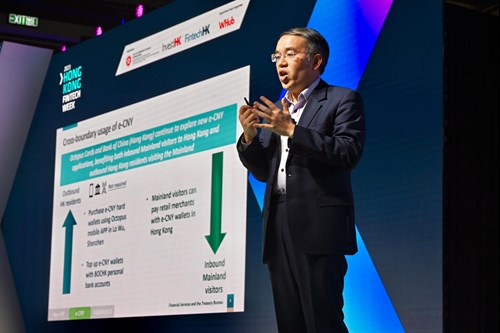
“Real economy related applications and innovations by the VA and Web3 sector will provide further impetus for growing our Fintech ecosystem.”
Keynote by Christopher Hui, Secretary for Financial Services and the Treasury, HKSAR
Christopher Hui shared three “major initiatives to foster Fintech development” which aim to link financial technology with the mainstream finance and retail economies. The initiatives will cater to different sectors of the market by enhancing efficiency and connectivity. He expressed government support for the innovation and sustainable development of Fintech in financial, asset, and green spaces.
Hui announced an Integrated Fund Platform “to add one more layer, one more component to Hong Kong’s whole suite of financial infrastructures, which is a development of a new integrated fund platform targeting the retail sector.” The integrated platform, which will launch at the end of 2024, was developed in partnership with HKEX. The platform will serve the roles of a communication hub, a business platform, and an information portal for further strengthening Hong Kong's position as an international asset and wealth management centre.
Other initiatives include welcoming cross-boundary eCNY usage, to “further integrate eCNY into our local financial ecosystem”. FSTB also revealed that Octopus Cards Limited (OCL) and Bank of China (Hong Kong) (BOCHK) will seek to explore new eCNY applications. Hui also added there will be “efforts to introduce further enhancements of our regulatory regime, as well as promoting real economy related applications and innovations by the VA and Web3 sector. These initiatives will contribute to the real economy and provide further impetus for growing our Fintech ecosystem."
Please refer to the official speech here.
Click here to watch the playback.
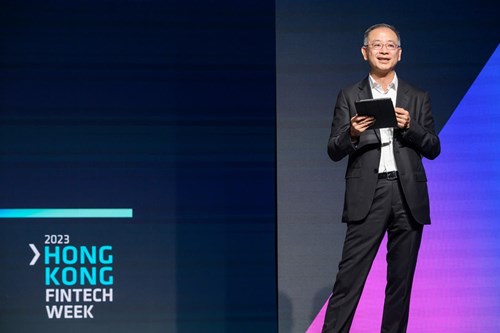
“To move Fintech forward we need a cross disciplinary mindset.”
Keynote by Eddie Yue, JP, Chief Executive, Hong Kong Monetary Authority, HKSAR
Hong Kong Monetary Authority Chief Executive, Eddie Yue opened his keynote with a whirlwind account of his avatar’s vacation in the multiverse across three continents and two oceans. As he welcomed a return to the real world, he observed how the Fintech world has evolved significantly from a mere buzzword in 2016 to now being an everyday part of life in Hong Kong with successes like Hong Kong’s Faster Payments System (FPS). He predicted the next stage of Hong Kong’s Fintech journey would require three key areas of attention: long-term commitment and sustained investment; a cross disciplinary mindset; and cross-sector and cross-border collaboration.
“In our mission to redefine Fintech, we believe Fintech is more than the convergence of ‘fin’ and ‘tech’. It is an interdisciplinary subject that intersects across various fields like law, sociology, politics, economics and more. To move Fintech forward we need a cross disciplinary mindset.”
HKMA is working closely with the Bank of Thailand to link Hong Kong’s FPS and Thailand's PromptPay, in a new service called "FPS x PromptPay QR Payment,” set to launch on December 4. Hong Kong’s FPS users will be able to connect to over eight million PromptPay merchants in Thailand, while the 50,000 FPS merchants in Hong Kong will also accept payments from PromptPay users in Thailand. Yue also predicted the use of data to be more extensive and diverse with the creation of a data policy unit announced in the recent policy address. While the pace of blockchain innovation and especially tokenisation will increase in coming years, HKMA is in discussions with market participants to explore further use cases for distributed ledger technology (DLT) in capital markets, including a second tokenised government green bond.
Please refer to the official speech here.
Click here to watch the playback.
Digital Assets and Web3
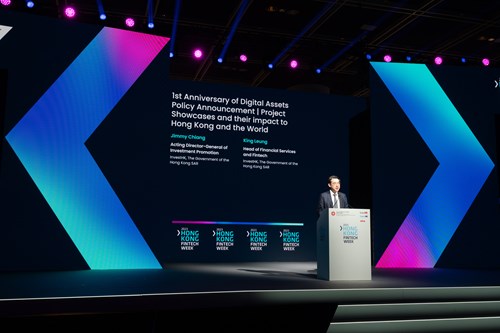
1st Anniversary of the Digital Assets Policy Announcement | Project Showcases and their impact to Hong Kong
Panel discussion featuring:
Jimmy Chiang, Acting Director-General of Investment Promotion, Invest Hong Kong, HKSAR
King Leung, Head of Financial Services and Fintech, Invest Hong Kong, HKSAR
Brian Chan, Group Head of Investment and Products, VSFG
Henry Chan, Co-Founder, Head of Product & Innovation Speaker, Artifact Labs
Niki Ariyasinghe, Head of Business Development, Asia-Pacific and Middle East, Chainlink Labs
Leo Lin, Founder, Arkreen Network
Anna Liu, General Manager of Tokenisation, Hashkey Group
Eddie Lau, Co-CEO, Arta TechFin
Gary Tiu, Executive Director and Head of Regulatory Affairs, OSL
In celebration of the first anniversary of the Digital Assets Policy Announcement, Invest Hong Kong’s King Leung expressed happiness at the past year of progress in the Web3 and digital asset space. Alongside Leung, Jimmy Chiang introduced four projects that he lauded for demonstrating how “Web3 can add value to the economy, improve lives of Hong Kong residents and bring global impact.”
Arta Techfin: Tokenised funds supported by Chainlink brings Chainlink Cross-Chain Interoperability Protocol (CCIP) to deliver investment returns and enable secure transfer across public and private blockchains. Niki Ariyasinghe of Chainlink said, “Chainlink is the industry standard for essential infrastructured services in Web3. We are proud to partner with Arta Techfin to bring the benefits of two of our key offerings to the users of Arta’s platform.”
Hashkey Tokenisation: Arkreen Project operates from the bottom-up to aggregate community data, creating a Web3 renewable data energy network. Anna Liu of the Hashkey Group said, “We understand the Hong Kong government regulators aim to support the urban upgrade and economic transition in Hong Kong. We believe tokenisation can serve as both the router and the connector.”
OSL Digital Securities’ Gary Tiu announced that OSL has initiated an exploratory discussion with the SFC for tokenised retail products, and fund products in particular. Looking forward to the not-too-distant future, he predicts “tokenised structured products”, “investment-grade global giants being issuers of tokenised instruments” and investors having “a lot more choice on the products, credit quality, and risk assessment profiles they can pick from when they invest.”
Brian Chan, Group Head of Investment and Products for VSFG said that the “tokenisation of RMS Titanic taps into Hong Kong’s burgeoning status as an Intellectual Property trading hub. Henry Chan of Co-Founder, Head of Product & Innovation Speaker at Artifact Labs agreed, noting that “Artifact Labs focuses on preserving historical and cultural assets on the blockchain, allowing them to be managed digitally.”
Click here to watch the playback.
Digital Assets: How do traditional financial service providers claim their seat at the table?
Panel discussion featuring:
Adrian Clevenot, Associate Director, Digital Assets Market Lead, PwC
Alex Manson, Head of SC Ventures, Standard Chartered
John O'Neill, Managing Directory, Head of Digital Assets, Global Banking & Markets, HSBC
Roger Bayston, Executive Vice President, Head of Digital Assets, Franklin Templeton
Scott Lucas, Managing Director, Head of Markets DLT, J.P. Morgan & Co.
Leaders of major banks and investment companies gathered to discuss how traditional institutions can embrace digital assets and new technologies. They highlighted the role of trust and advisory for banks stepping into Fintech as they build trusted, safe, and robust infrastructures for trading.
John O’Neill from HSBC reflected on the integration of their platform Orion, “The trick with getting a digital asset platform is not so much the technology. So the technology is important of course, but it’s really about marrying the technology and law and regulation together.” With an eye on connecting to customers and to new markets, O’Neill posited the importance of both native digital and real-world assets, such as HSBC’s tokenisation of real gold.
Scott Lucas of J.P. Morgan echoed the importance of legal and payment infrastructures, and emphasised taking risks by building next phases through gradual evolution, “It takes time to build that capability within a scalable market. So you’re not going to leap from a structure you have today to a whole new decentralised market.”
“We are going back to the client, serving them how they want to be served within a safe and robust environment, building an institutional-grade infrastructure for custodies,” added Alex Manson of SC Ventures. This is in light of the entry of SC Zodia Custody into Hong Kong announced just this week.
Finally, Roger Bayston of Franklin Templeton wrapped it up with a “Shoutout here to Hong Kong for being able to create an environment that allows these opportunities to begin with.”
Web3 reshapes the financial services model
“Web3 will develop into two models of either a hybrid or full-decentralised mode.”
Spark Zhang, Chief Strategic Officer of Huawei Blockchain & Chief Technology Office of Huawei Cloud, Huawei
Spark Zhang, Chief Strategic Offers of Huawei Blockchain & Chief Technology Office, Huawei, shared his insights into how Web3 can reshape the financial sector in mainland and Hong Kong. He explained that Web3 resolves Web2’s inadequacies in privacy and unequal resource allocation, and emphasised the reliability and agency Web3 can provide to users. He predicted that Web3 will develop into two models of either a hybrid or full-decentralised mode, but remarked that both could be fully integrated by financial services.
He provided an overview of how existing Web2 systems can transition into a Web3 infrastructure, pointing out that this move can eliminate Web2’s inadequacies and add value to the overall financial system. One way to do so is for systems to transfer from monetary payments to digital tokens and central bank digital currency (CBDC), as well as for business’ platforms to use top tech like cloud, AI blockchain, and professional services to smoothly facilitate the transition.
He ended the session by inviting Hong Kong’s enterprises to take part in conversations to facilitate the integration of Web3 into the financial industry.

“Crypto is going in the right direction.”
Fireside chat with Crypto.com CEO Kris Marszalek
Moderated by Henri Arslanian, Co-founder & Managing Partner, Nine Blocks Capital Management
Henri Arslanian, the Co-founder & Managing Partner of Nine Blocks Capital Management, dived right into his fireside chat with Crypto.com CEO Kris Marszalek with the trillion dollar question. After a remarkable year for the entire crypto tech ecosystem, what’s your view on the market today?
“It’s going in the right direction. We've had what was a necessary clean up. A few players who were not supposed to be in place are now gone. And the builders are busy rebuilding the trust in the industry,” said Marszalek.
His message for people working in the broader Hong Kong business and financial services community was straight forward. “I think there's probably never been a better time to join the cryptocurrency revolution than right now. Looking at what's happening in this space, the best way you can use your skill set is to help take the market to the next level,” he said.
Quizzed on what’s in store for crypto between now and 2030, Marszalek admitted that forecasting is almost impossible. However, he recognised that the convergence of A.I. and crypto is inevitable. “This is a completely new world where it's hard to tell what is real, what is not. So blockchain is a perfect technology to help us navigate this new uncertainty. It's incredibly interesting and it's evolving so quickly.”
Fintech Innovation

Embracing Innovation, Regulation and the Future of Finance
Fireside chat with Julia Leung, Chief Executive Officer, Securities and Futures Commission of Hong Kong
Moderated by: Christopher Woolard CBE, Partner, Ernst & Young
Chris Woolard from Ernst & Young distilled his session with Securities and Futures Commission of Hong Kong CEO Julia Leung down to the two most talked about topics – tokenisation and AI.
“Three years ago, the concern was that ELT would actually dominate and upend the entire industry. The view now is more realistic. This is not going to be revolutionary, just evolutionary, as the Web3 ecosystem needs time to build out, but it is definitely coming,” Leung said.
Tokenisation of a fund or bond doesn't change its nature – it’s a security and will be regulated as such. However, as a regulator, Leung sees potential benefits of tokenisation, such as increasing efficiency throughout the product lifecycle and lowering costs.
“While we are supportive of the industry, experimenting, making more of these use cases, we also see new risks associated with it. Later today, we'll be issuing two circulars; one identifying the risks and what regulators expect from intermediaries when doing their due diligence, and another covering additional safeguards on issuing authorised funds and public funds,” she said.
Addressing the interest around A.I., Leung was candid about the SFC’s view. The commission has successfully used machine learning and AI in surveillance for years, and is now assessing the potential of generative A.I.
“We are considering the use cases very carefully, such as whether they create hallucination risks, when they give you a very convincing response to questions, but are sometimes obviously wrong,” she said.
Since you can’t arrest an A.I., a firm’s Senior Manager remains responsible. “We think it’s time to remind our licenced corporations about their risk management obligations, especially in high risk cases, to consider whether humans should be included in the loop,” she said.
Click here to watch the playback.
For more information about SFC’s announcement, please refer to the below:
- SFC welcomes new financial infrastructure for retail fund distribution in Hong Kong
- Circular on intermediaries engaging in tokenised securities-related activities
- Circular on tokenisation of SFC-authorised investment products

A dialogue with the Financial Conduct Authority UK
Nikhil Rathi, Chief Executive, Financial Conduct Authority, United Kingdom
Moderated by Neil Tan, Chairman, FinTech Association HK
As the CEO of the UK regulator for market integrity and competition, Financial Conduct Authority CEO Nikhil Rathi supervises around 50,000 firms. He also oversees the world’s largest market for derivatives foreign exchange. One of his biggest challenges is trying to work out where to devote the FCA’s resources?
“We said recently we're going to focus with our asset management sector on fund tokenisation, and launched a discussion paper with the wealth management asset management industry. tokenisation came up as number one in terms of technology developments,” he said.
The FCA is also in the process of evolving its regulatory framework for crypto assets. A couple of years ago it began registering crypto asset platforms for anti money laundering purposes. “That's been a challenging experience. We implemented a travel rule in the UK, which allows the beneficiary and sender information to be shared for crypto assets, and we want to see that implemented globally,” he said.
Rathi says one should never underestimate how small reductions in friction in the payments world can drive very significant changes in consumer behaviour. In the UK, over 37% of payments are now contactless.
“This question of how consumers wish to pay for services or store their deposits could move very quickly. For example, in some jurisdictions, when banking turbulence and the prevalence of social media has made deposits much, much less sticky. So money could start moving much faster than has been the case historically. That's important from a consumer protection perspective, and important from a perspective of how the deposit protection system works,” he explained.
Click here to watch the playback.
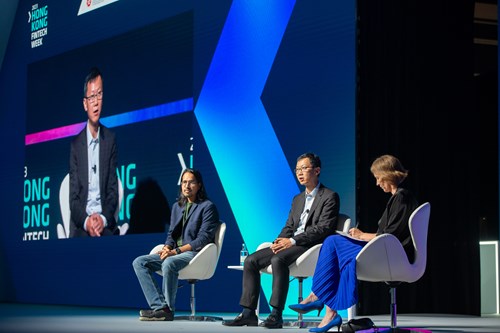
Private sector trends and innovation in cross-border payments·
Panel discussion featuring:
Surendra Chaplot, Global Head of Product, Wise
Forest Lin, Corporate Vice President of Tencent, Head of Tencent Financial Technology, Tencent
Moderated by: Bénédicte Nolens, Centre Head, BIS Innovation Hub
Three leaders from companies known for their digital payment solutions sat down to discuss how Fintech can improve current cross-border payment systems. Chaplot revealed three common pain points for customers on current cross-border payment systems from traditional banks and financial institutions: high costs, long transaction time, and a lack of transparency; Lin added a fourth – a lack of what he called “scenarios,” referring to tailored strategies targeted towards specific issues.
Asked by Nolens, who moderated the session, Lin then noted that current cross-border payment systems are “not designed for individual and SMB payments,” which are small in sum and are conducted frequently. He added that institutions need to work with one another to make cross-border payments more time- and cost-efficient, using an “open system” between institutions that will “gradually develop and interweave into a global network.”
Chaplot echoed the sentiment, and remarked that “we as consumers deserve a solution which is inherently transparent so you’re clear on how much you’re paying, how quick would the transfer be, and how much the recipient is going to get.”
Click here to watch the playback.
Concept to Reality: CBDC in Action
“There is a pain point today with cross border retail – foreign exchange and merchant acceptance. Emerging trends in CBDC are allowing us to bridge these gaps.”
Tim Ying, CEO, Octopus Holdings Limited
Tim Ying, CEO from Octopus unveiled the world’s first cross-border retail use case for CBDC. Octopus is enabling eCNY (digital yuan/RMB) top-up directly to the Octopus wallet. This allows inbound travellers to pay and shop across 180,000 outlets and all means of transport in Hong Kong. “Travellers can now pay like a local seamlessly.”
“There is a pain point today with cross border retail – foreign exchange and merchant acceptance. Emerging trends in CBDC are allowing us to bridge these gaps,” said Ying. He talked about the growing payment challenges of inbound and outbound travellers as they seek authentic travel experiences and how the Octopus decentralised payment network provides “super resilient and super fast” transactions.
Travellers using the Octopus eCNY solution can also avoid the manual processes of acquiring an octopus card and conducting top-ups. Both features can now be provisioned directly to mobile phones using eCNY as the payment method, as well as processing refunds from remaining card balances when leaving the country.
“Our future vision doesn’t end here. Whether visiting from the GBA, SZ GZ, or a tourist going to SEA – we want to go where our customers go. We will remove friction around payments to help people connect, explore and create unforgettable experiences.”
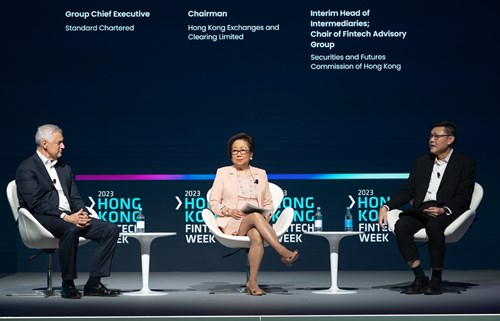
Fintech Innovation: Balancing Opportunities and Risks
Panel discussion featuring:
Bill Winters, Group Chief Executive, Standard Chartered
Laura M Cha, Chairman, Hong Kong Exchanges and Clearing Limited
Moderated by: Keith Choy, Interim Head, Intermediaries; Chair of FinTech Advisory Group, Securities and Futures Commission of Hong Kong
Keith Choy of the Securities and Futures Commission of Hong Kong, moderated a discussion on the need to embrace the opportunities presented by Fintech while managing risks of fraud and unreliability. The fundamental notion was that evolving demands for Fintech must be met by leading institutions to best manage risk.
Laura Cha emphasised the Hong Kong Exchange’s embrace of technology and innovation in its internal operations and its investment decisions: “We see ourselves very much as a facilitator in the ecosystem of Fintech and of technology.” She noted that “innovation and technology has to be backed and balanced by certainty, stability and reliability in terms of risk management.”
Bill Winters of Standard Chartered opined that Fintech must be adopted despite the risks. “Do we really want to take risks with these critical economic and social functions? Of course not. But at the same time, we know that if banks aren’t part of the process of engaging in this innovation, we will end up with a bifurcated economy, which is actually riskier,” he said.
“To understand the applications, you have to be in the market. And to be in the market, you will need the infrastructure,” Winters added.
Click here to watch the playback.

CEO Dialogue: Reshaping the Future of Finance
Panel discussion featuring:
Aveline San, Chief Executive Officer, Citi Hong Kong & Macau
Mary Huen, CEO, Standard Chartered Hong Kong
Luanne Lim, Chief Executive Officer, HSBC Hong Kong
Sun Yu, Vice Chairman and Chief Executive, Bank of China (Hong Kong)
Moderated by: Kristi Swartz, Partner, DLA Piper
Kristi Schwartz from DLA Piper, took the CEO panel on a journey through some of the most pressing technology issues reshaping the future of finance.
According to Sun Yu, Vice Chairman and Chief Executive, Bank of China (Hong Kong) the adoption of Fintech is time consuming, never ending, sometimes painful, but also a fruitful process.
“An AI supported chatbot recently transformed the interactions between our staff and our clients, making the communication more efficient, more personalised and more skilled. I firmly believe this kind of integration of AI into everyday business and just starting,” he said.
He noted that most transformation is not digital, but about rebooting the patterns and structure of the overall business. “It's not an easy job, but it can eventually benefit us and the overall financial industry in Hong Kong,” he added.
Luanne Lim, Chief Executive Officer, HSBC Hong Kong pinpointed diversity as another challenge. “This panel is a very diverse group. We don't have that in technology. We need more women in technology,” she said.
The issue is not limited to technology. The venture capital and startup communities are also markedly male-dominated. “In all these three areas, women are underrepresented. Let's face it, we absolutely need more diversity in technology and Fintech startups,” she said.

Fintech Trailblazers: Women at the Forefront (powered by Citi)
Panel discussion featuring:
Angelina Kwan, Chief Executive Officer, Stratford Finance and Senior Advisor, IMC Asia Pacific
Fiona Lau, Entrepreneur and Co-founder, Shopline
Venetia Lee, General Manager for Greater China International Business, Ant Group
Moderated by: Aveline San, Chief Executive Officer, Citi Hong Kong & Macau
Citi’s Aveline San began by posing the central problem: “research has shown that whilst women can progress, women leaders in Fintech remain rare.” The panel of female business role models shared advice on pursuing Fintech, with Venetia Lee of Ant Group encouraging women to embrace their traits of “agility” in this fast-moving industry and empathy to design products that are “not only functionally but emotionally a delight to use”.
Angelina Kwan traced the issue of gender imbalance to education. Drawing from her experience as Chair of The Women’s Foundation, she expressed how parents discourage daughters from pursuing science education, and that the “number one” thing companies can do is to “look at the way that you actually train, as well as recruit staff.” She also emphasised financial inclusion of female customers into payment systems and technology offerings.
Shopline entrepreneur Fiona Lau encouraged aspiring female businesswomen to remove mental blocks and fixations on anxieties to “just dive in.” She also highlighted the importance of support systems at home and at work that will enable entrepreneurs to “ride out the challenges and become very successful.”
Artificial Intelligence
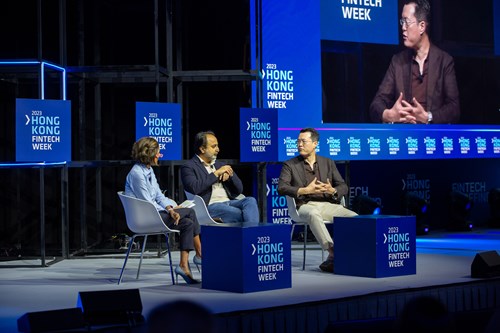
Investment in AI
Panel discussion featuring:
Hemant Taneja, CEO, General Catalyst
Mike Xu, Co-chairman and CEO, Fosun Group
Moderated by: Harshika Patel, CEO, Hong Kong & Head of Asia Pacific Strategy J.P. Morgan
Two leading tech investors discussed the surging interest and hype around AI today which has some observers noting that AI is being discussed as much as global macro issues like geopolitics and interest rates. The moderator highlighted Google CEO Sundar Pichai’s claim that “AI is the most profound technology humanity is working on. More profound than fire, electricity, or anything that we have done in the past.”
Xu from Fosun Group and Taneja from General Catalyst, both echoed the huge transformative potential of AI today. Xu enthused how AI is becoming an everyday assistant that will significantly improve productivity, “so that we can all become CEOs.” Taneja believes that AI will be more impactful than the Internet. “The Internet drives greater efficiency in connectivity for society, but if we use AI properly, it has the potential and scale to transform much more than connectivity,” he said. Both speakers noted how investment bubbles are good for intergenerational technologies like AI, as overinvestment will help to realise the full potential of AI.
Rethink Artificial Intelligence with Dr Kai-Fu Lee
“Think of AI as a child, learning not from books, but from millions and millions of web pages and having access to 100 PHDs in a black box.”
Fireside chat with Dr Kai-Fu Lee, Chairman and CEO, Sinovation Ventures
Moderated by: Emily Chan Tan, Senior Correspondent, CNBC
Renowned AI guru Kai-Fu Lee declared that many of today’s research projections on AI are conservative. He pointed to the OECD’s prediction that new automation technologies like AI will in 15-20 years remove 14% of global jobs and radically transform another 32%. “OECD numbers are roughly two to three times off, they are too conservative,” said Lee.
He noted that the emergence of generative AI technologies like ChatGPT are having a profound impact in a way that past technologies cannot match in terms of speed and scale of development and adoption. “Think of AI as a child, learning not from books, but from millions and millions of web pages and having access to 100 PHDs in a black box.” Lee added that: “AI will impact every job in every industry, if you are not learning how to use generative AI today, you are at a huge disadvantage to your peers and competitors.”
On the sensitive issue of job displacement. Lee predicted that blue collar jobs should be safe for now as it is harder to perfect robotics than technologies like generative AI, while roles that involve truly creative forces like Steve Jobs or Mozart, or complex judgement like CEO roles would be irreplaceable by AI. Another sector to breathe easier is the service sector as Lee predicted roles that require empathy or genuine human connection such as nursing, elderly care and counselling would remain with humans.
China and the Greater Bay Area
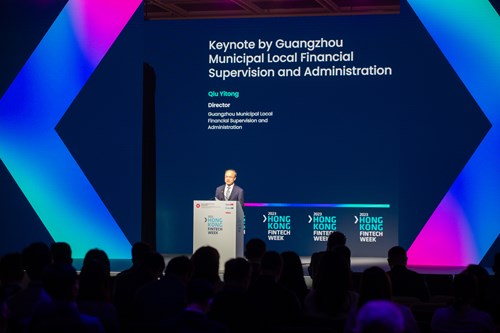
Keynote by Qiu Yitong, Director, Guangzhou Municipal Local Financial Supervision and Administration
Qiu Yitong, Director of the Guangzhou Municipal Local Financial Supervision and Administration, introduced Guangzhou’s financial sector and its achievements in Fintech.
Qiu shared that as of September 2023, Guangzhou has 230 publicly traded companies and that the financial sector’s total assets have reached over 11 trillion RMB in value. He also highlighted strong points of Guangzhou’s financial sectors, such as a high concentration of financial institutions, successful financial pilot zones (e.g. the Guangzhou Green Finance Reform and Innovation Pilot Zone). He then outlined plans to develop Guangzhou’s Fintech economy, from encouraging Fintech innovation to fostering talents within the city. He ended the session by praising Hong Kong for having abundant resources to develop thriving Fintech companies, talents, and economies, adding that Guangzhou will “actively increase support for the financial industry, and through creating an excellent business environment, attract domestic and foreign financial institutions to set up headquarters, and encourage key market players like financial trading platforms and Fintech companies to develop in Guangzhou.”

“Intensive cross-border cooperation between two cities is very important”
Keynote by He Jie, Director, Shenzhen Local Financial Supervision and Administration
He Jie emphasised Shenzhen as a young, innovative city with a highly active developing economy. As an emerging global financial centre, Shenzhen is also recognised as a leading centre for Fintech in Asia Pacific because of its mature Fintech ecosystem that encourages innovative applications. He expressed the importance of connections to Hong Kong and encouraged further Fintech cooperation and integration between the cities.
He stated, “I wish to highlight the successful results of the Fintech Talent Nurturing programme launched in 2019 in tandem with the Hong Kong and Macau Monetary Authorities, where over 2300 applicants gained first-class certificates. Shenzhen intends to deepen and expand the programme, the first in the world of its kind.”
With Shenzhen entrepreneurs investing and expanding their businesses in Hong Kong, and a lot of Hong Kong talent working in Shenzhen, He wished for the furthering the One Country, Two Systems relationship to cooperate on overcoming problems faced in their integration. Furthermore, a plethora of upcoming events organised by the city includes Shenzhen Fintech Week and the 5th World Science and Technology Development Forum, where the relationship with Hong Kong will be highlighted through partnerships and focused discussions.
Click here to watch the playback.
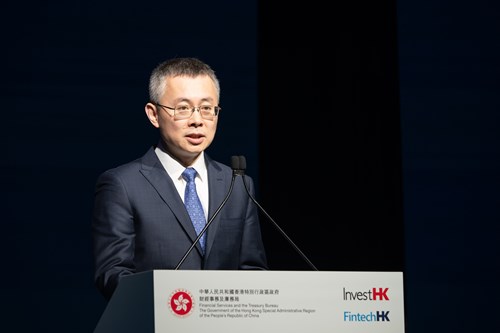
Shanghai Stock Exchange
Wang Bo, Deputy General Manager, Shanghai Stock Exchange
Wang Bo, Deputy General Manager of Shanghai Currency Exchange, discussed how digital transition can better improve the Stock Exchange’s functions, and delved into an exploration of the Shanghai Stock Exchange’s current digital practices. He noted that building a digital ecosystem can greatly enhance the capabilities of financial services, stating that technology like AI, machine learning, and cloud computing can effectively enhance the penetration rate of financial services. He remarked that with increasingly complex business and illegal behaviours, a digital reform can solve manpower insufficiency shortages and lagging information.
He then explored the practical applications of Fintech at the Stock Exchange, including a digitalisation committee, the launch of the 14th Five-Year Plan, which provided a clear direction for technological implementation for the Exchange. He announced that the Exchange is creating a reliable, autonomous, and easy-to-use core trading system to improve the processing speed of transactions.
On Hong Kong, he remarked that the city is “in a unique position where it has the support of the Mainland but projects internationally,” and that the Shanghai Stock Exchange “seeks to further their collaboration with the city and aid in vitalising Hong Kong’s market activities to promote a synergy between the two markets.”
Click here to watch the playback.

Shenzhen Stock Exchange
Li Mingzhong, Executive Vice President, Shenzhen Stock Exchange
Li Mingzhong, Executive Vice President of the Shenzhen Stock Exchange, outlined the Shenzhen Stock Exchange’s accomplishments through the implementation of technological innovations. Li began by detailing the Stock Exchange’s past use of AI and other cutting-edge technologies to achieve positive results in multiple areas from audit listings to supervision of publicly-listed companies. He emphasised that the Stock Exchange strongly supports the digital transition for listed companies.
Li then announced the Stock Exchange’s Fintech-related achievements this year, including identifying suspicious activities with its use, as well as research on blockchain platforms and industry applications. He highlighted the cooperation between Hong Kong and Shenzhen in financial infrastructural development, such as data exchange platforms and cloud data centres. Finally, Li pledged that the Stock Exchange will work with all parties to accelerate the integration, innovation, and promotion of Fintech, and promised to encourage a high level of openness with Hong Kong.
Click here to watch the playback.
Keynote by Shenzhen Venture Capital Association
Chen Wei, President, Shenzhen Venture Capital Association
Chen Wei, the President of the Shenzhen Venture Capital Association, explained how entrepreneurship, innovation, and venture capital are the Greater Bay Area’s (GBA) new driving forces for economic growth.
He began by stating that China’s economy is currently in a time of turmoil, but remarked that all investment opportunities are rooted in uncertainties. Despite this sentiment, he predicted that China is set to become the global economic leader in 10 to 15 years.
He then mentioned the effectiveness of bay areas around the world in pushing the economy, using economically advanced bay areas such as the San Francisco Bay Area as a comparison to the GBA in terms of GDP and income, value of listed markets, number of technological unicorns, and VCPE investments, stating that the GBA has yet to catch up to these areas.
Chen suggested the implementation of a financial system between GBA cities to increase the flow of capital, talent, information, and technology, and the establishment of a 100 billion RMB cross-border Science and Innovation fund. Finally, he suggested using Hong Kong’s identity as Asia’s leading financial centre to attract international venture capital talents and improve the overall GBA investment management sector.
Chen ended the session by stating that “China has made its manufacturing industry the best in the world; in the future, we must make our venture capital economy the best as well,” and that “the future of the GBA is the future of China.”
Click here to watch the playback.
Disclaimer
The views and opinions expressed in Hong Kong FinTech Week are those of the speakers, commentators, experts and/or hosts/sponsors. They do not explicitly or necessarily reflect, nor represent the views held by Hong Kong FinTech Week, WHub, or the Government of Hong Kong Special Administrative Region. This conference has been produced to give participants a general information and a general understanding of the Fintech industry and is not to provide specific legal or investment advice.
Hong Kong FinTech Week, WHub, or the Government of Hong Kong Special Administrative Region cannot be held accountable for any views expressed during Hong Kong FinTech Week.
The information contained in this publication is for general reference only. While every effort has been made to keep information current and accurate, Hong Kong FinTech Week, WHub, or the Government of Hong Kong Special Administrative Region, does not accept any responsibility whatsoever in respect of such information. There is no implied endorsement of any materials or recommendation of a company or service provider over another.
About Hong Kong FinTech Week
Hong Kong FinTech Week 2023, organised by the FSTB and InvestHK, and co-organised by the HKMA, the SFC and the IA, is Asia's global financial technology event for scaling new heights. It is expected to host over 300 speakers, 540 sponsors and exhibitors, welcoming over 30,000 attendees and attracting over 5 million views from over 90 economies to the event. The week-long event will feature multitrack conferences with prominent speakers, exhibitions, a deal floor, workshops, networking and satellite events, demo sessions and metaverse experiences.
About InvestHK
InvestHK is the department of the Hong Kong Special Administrative Region Government responsible for attracting foreign direct investment. It has set up a dedicated Fintech team in Hong Kong to attract the world's top innovative Fintech enterprises, start-up entrepreneurs, investors, and other stakeholders to set up and scale their business via Hong Kong into Mainland China, Asia, and beyond. For more information, please visit www.hongkong-fintech.hk.
Media
Adrianna Lau
+852 3756 8615
Adrianna.Lau@edelman.com
Bonita Wong
+852 2837 4758
Bonita.Wong@edelman.com
- Tags